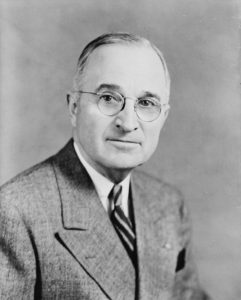Truman Reversal on Zion Raises Storm of Protest, NY Post, Mar. 21, 1948.
A virtual cyclone of protest blew up Saturday over American abandonment of Palestine’s partition, and President Truman was the center of the storm.
In Washington, Senators and Representatives of both parties condemned the new U. S. proposal in terms ranging from “the most terrible sell-out since Munich, to “wicked and iniquitous.”
Leon Henderson, a New Deal stalwart under President Roosevelt, and chairman of Americans for Democratic Action, charged the U. S. move “betrays the hopes of peoples everywhere that this nation is prepared to place world order above power politics.”
ADA, a coalition of anti-Communist liberals which has been described as “the New Deal government-in-exile,” heretofore had left the door open for endorsement of Mr. Truman’s candidacy, and Hendorson’s pronouncement was the sharpest criticism of the Administration the organization ever has issued.
Rep. Celler (D.N.Y.), who called “the back-breaking by President Truman wicked and iniquitous, “said “there apparently is no trust in the plighted word of the Administration.
“Another reference to the General Assembly means,” he declared, “that we are just where we starred, with interminable deplete bewilderment., The Senate has no knowledge of the State Dept’s decisions or what its next move will be.”
Celler predicted establishment of the Jewish state on schedule, however.
Rep. Klcin (D. N. Y.) said the U. S. change in position was “the most terrible sell-out of the common people since Munich “and Rep. Bloom (D.N.Y.) said he “can’t agree to that proposal in any way, shape, or form, what assurance is there that trustee ship is going to be any more successful than partition has been?”
Reps. Javits (R.N.Y.) and Mareantonfo (ALP-N.Y.) voiced similar opinions.
Sen. Lueas (D.IH.), Democratic whip, declared he was “shocked and surprised.”
From the G.O.P. side, Sen. Taft (R-O.), said the new proposal would invite “worse confusion for the Holy Land. If the plan is accepted, the Security Council will have to send an armed force to Palestine to support the U.N. trusteeship. All of the objections raised by the Administration to the use of armed force when it was to enforce partition will apply just as strongly to this plan.”
Sen. Thye (R-Minn.), a supporter of Harold E. Stassen’s Presidential candidacy, joined Taft in criticizing the move. “This action leaves Congress in complete bewilderment about where we are going and where is our leadership. The Senate has no knowledge of the State Dept.’s decisions or what its next move will be.”
Sen. Ferguson (R.Mich-) said it was “unbelievable” that the U. S. had reversed its position. Sens. Vandenberg (R-Mich.) and Connally (D-Tex.) declined comment.
In a radio speech, Henry Wallace declared “Americans must “keep our word and carry out decisions once arrived at or we are going to lose all the great moral leadership we had at the end of the war.”
Frank Goldman, president of B’nai B’rith, said “The proposal is an amazing reversal of the unvarying policy of five preceding administrations and of the Congress for more than a quarter century. In my judgment, it is contrary to overwhelming American public opinion.”
The political implications for the President were grave. Many Democrats conceded privately that he had lost ground in the big cities, where Zionism is strongest, and some thought Wallace would be the gainer. Others believed the Republicans were likely to profit.




